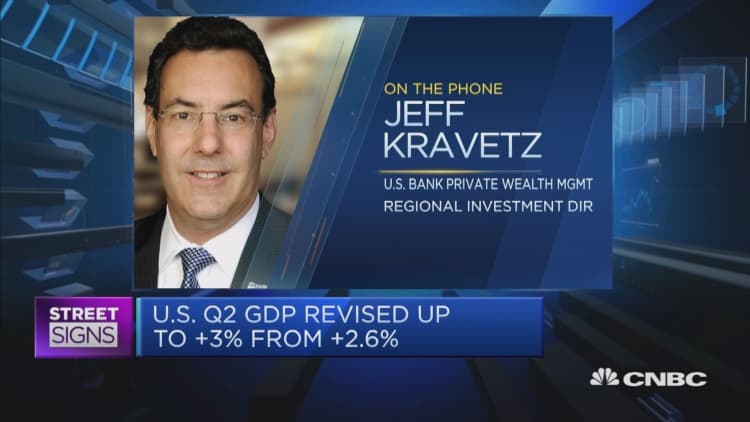
Congress didn't finish its work on the fiscal 2018 government budget and defense spending before the summer recess, but now with disaster relief aid needed for Hurricane Harvey, the job just got more complicated.
"It's got to kind of contribute to pressurizing the discussion in Washington about adding money to defense," said Thomas Spoehr, director of the Center for National Security at the Heritage Foundation, a conservative think tank.
So far, Democrats and some Republicans have opposed the Trump administration's plan to pay for increases in defense spending with big cuts to the Environmental Protection Agency, Medicaid and the food stamp SNAP program, among others. Harvey, though, may add pressure at some point to finding ways to offset increased disaster relief aid.
Another possibility is the Trump administration may reject 2018 defense spending proposals by the House and Senate.
Veto threat
"If anything, I see the conflict between Congress and the president as the proposals right now in both the House and the Senate are a lot higher than what the president has been asking for," said Dan Grazier, a defense industry expert at the Washington watchdog group Project on Government Oversight. "There's always that potential of a veto threat, but it all remains to be seen."
Besides Harvey, lawmakers returning to Washington next week must grapple with the debt ceiling. And there have been calls by some members of Congress that Harvey shouldn't be tied to raising the debt limit.
Before the Gulf disaster, President Donald Trump had threatened to shut down the government unless he received money for the border wall. But analysts say Harvey makes that scenario almost unthinkable.
'Battle lines' drawn
"There's a lot of still very sharp battle lines that are drawn, but no one is interested in having that fight right now, especially if the consequences of that fight are that there's a government shutdown in the middle of an enormous relief effort," said Katherine Blakeley, a research fellow at the nonpartisan Center for Strategic and Budgeting Assessments.
Blakeley's prediction: Congress will pass a short-term spending bill, or a continuing resolution — known as a CR — to keep the federal government operating for about three months. She also expects there will be "a large supplemental" specifically for Harvey relief.
A short-term CR is something Congress has resorted to before but it still remains unpopular with the Pentagon and defense contractors. It would essentially hold spending to prior-year enacted levels for the budget and stops any new defense programs that were previously not funded.
"A CR is not something we're looking to operate under," Christopher Sherwood, a Pentagon spokesman, told CNBC on Thursday.
Effects of CR
Earlier this week, two key members of the Senate Armed Services Committee, Chairman John McCain, R-Ariz., and ranking member Jack Reed, D-R.I., sent a letter to Defense Secretary James Mattis asking for "an in-depth list of impacts on the military — including military branches, defense-wide agencies, and combatant commands — for a 3-month and 6-month continuing resolution." They asked that the information be provided by Sept. 8.
The letter also hinted there could be cuts in the military if there is no budget deal to fund the government.
"Absent this budget agreement, no spending by any federal department or agency will be allowed to surpass the discretionary caps set by the Budget Control Act. In practice, this will result in billions of dollars in cuts to the defense budget from last year's level — cuts that the Department of Defense can ill afford at a time of diminished readiness, strained modernization, and increasing operations."
"The Department of Defense will have to go on a diet and not do things they had planned to do until the continuing resolution is off — and that will have some impacts," said Heritage's Spoehr.
Military pay raises
Pay raises for military personnel are scheduled to kick in around January, and if there's no budget resolution by that time it could be problematic for the Pentagon. Also, Congress needs to decide on the actual pay raise amount since the two chambers have proposed different amounts.
Another issue that could come up when the Senate votes on the defense funding is the transgender military ban. There's an effort to attach an amendment to reverse or stall Trump's controversial transgender ban.
The actual topline defense funding also varies between the Senate and House plans. And getting a bill that both the chambers can agree on remains a big challenge.
In July, the House passed the 2018 National Defense Authorization Act, the bill setting policy and a roadmap for defense spending for the next fiscal year. The House defense policy bill authorized a topline of $621.5 billion in the Pentagon's base defense programs, and another $75 billion for the war-related overseas contingency operations (known as OCO) in Afghanistan, Iraq, Syria and elsewhere.
'Slush fund'
The House defense spending plan was criticized by the White House because it takes $10 billion out of the OCO account and uses it for base budget program funding. And the OCO money, which some critics have described as a "slush fund," is exempt from sequestration caps.
The defense budget plan pushed by the Senate Armed Services Committee is for a national defense topline of $700 billion, which includes $60 billion for the war-related OCO account. The Senate plan still has to be voted on by the full chamber; it is higher than the Trump administration's $667 billion request and about $70 billion above the spending caps mandated by Congress.
Meanwhile, Cowen analyst Roman Schweizer said in a research note this week that the Pentagon "could make a supplemental OCO request to pay for additional troops and activity related to the new Afghanistan strategy and possibly for increased missile deployments in Asia."
He also said something to watch will be the Pentagon's fiscal 2019 budget request to the Office of Management and Budget, due around Sept. 11.
"Leaks could follow over the next several weeks," Schweizer wrote. "We have some concern that the increased spending included won't buy a Trump-type buildup and may not match some lofty long-term growth expectations."
WATCH: US budget talks and tax cuts next big risk events



